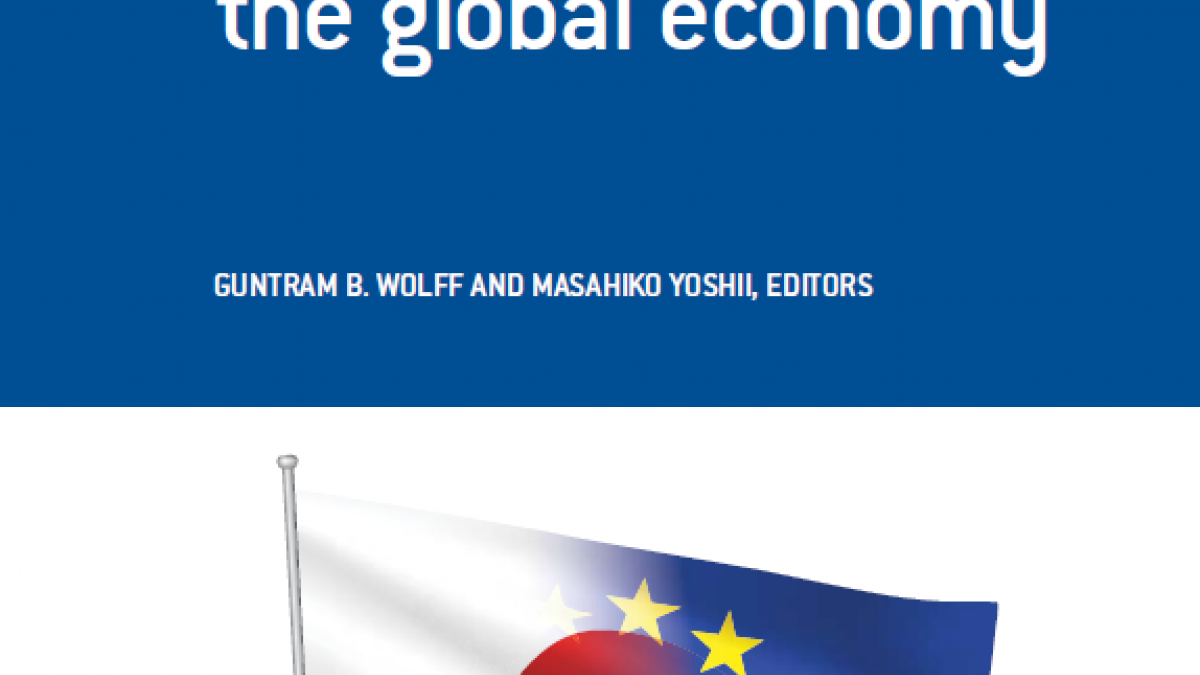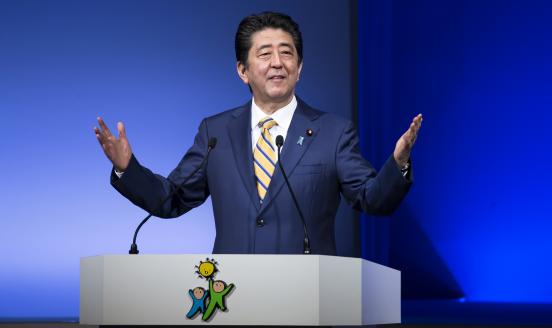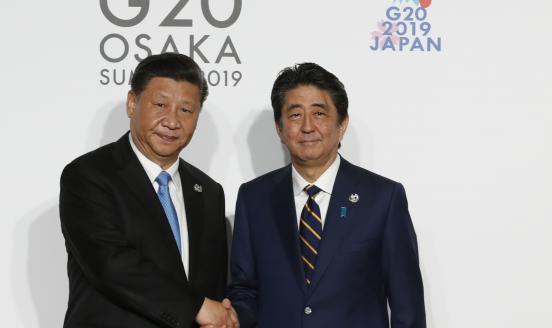- / Home
- / Publications
Japan and the EU in the global economy
This report analyses economic issues facing Japan and Europe. It identifies some of the channels through which Europe can learn from Japan, and viceve
- Publishing date
- 08 April 2014

Japan and the EU are both open economies with significant trade and financial links; both face in many respects similar challenges.
Both economies are affected by the rise of emerging market economies, which represent a huge opportunity but also imply the need to continuously adapt the production structure to the new competition. Both economies also face comparable internal economic adjustments.
This report sets out to address these issues, and to identify some of the channels through which Europe can learn from Japan, and viceversa.
About the authors
-
André Sapir
André Sapir, a Belgian citizen, is a Senior fellow at Bruegel. He is also University Professor at the Université libre de Bruxelles (ULB) and Research fellow of the London-based Centre for Economic Policy Research.
Between 1990 and 2004, he worked for the European Commission, first as Economic Advisor to the Director-General for Economic and Financial Affairs, and then as Principal Economic Advisor to President Prodi, also heading his Economic Advisory Group. In 2004, he published 'An Agenda for a Growing Europe', a report to the president of the Commission by a group of independent experts that is known as the Sapir report. After leaving the Commission, he first served as External Member of President Barroso’s Economic Advisory Group and then as Member of the General Board (and Chair of the Advisory Scientific Committee) of the European Systemic Risk Board based at the European Central Bank in Frankfurt.
André has written extensively on European integration, international trade and globalisation. He holds a PhD in economics from the Johns Hopkins University in Baltimore, where he worked under the supervision of Béla Balassa. He was elected Member of the Academia Europaea and of the Royal Academy of Belgium for Science and the Arts.
-
Zsolt Darvas
Zsolt Darvas is a Senior Fellow at Bruegel and a part-time Senior Research Fellow at the Corvinus University of Budapest. He joined Bruegel in 2008 as a Visiting Fellow, and became a Research Fellow in 2009 and a Senior Fellow in 2013.
From 2005 to 2008, he was the Research Advisor of the Argenta Financial Research Group in Budapest. Before that, he worked at the research unit of the Central Bank of Hungary (1994-2005) where he served as Deputy Head.
Zsolt holds a Ph.D. in Economics from Corvinus University of Budapest where he teaches courses in Econometrics but also at other institutions since 1994. His research interests include macroeconomics, international economics, central banking and time series analysis.
-
Guntram B. Wolff
Guntram Wolff is a Senior fellow at Bruegel. He is also a Professor of Public Policy and Economics at the Willy Brandt School of Public Policy. From 2022-2024, he was the Director and CEO of the German Council on Foreign Relations (DGAP) and from 2013-22 the director of Bruegel. Over his career, he has contributed to research on European political economy, climate policy, geoeconomics, macroeconomics and foreign affairs. His work was published in academic journals such as Nature, Science, Research Policy, Energy Policy, Climate Policy, Journal of European Public Policy, Journal of Banking and Finance. His co-authored book “The macroeconomics of decarbonization” is published in Cambridge University Press.
An experienced public adviser, he has been testifying twice a year since 2013 to the informal European finance ministers’ and central bank governors’ ECOFIN Council meeting on a large variety of topics. He also regularly testifies to the European Parliament, the Bundestag and speaks to corporate boards. In 2020, Business Insider ranked him one of the 28 most influential “power players” in Europe. From 2012-16, he was a member of the French prime minister’s Conseil d’Analyse Economique. In 2018, then IMF managing director Christine Lagarde appointed him to the external advisory group on surveillance to review the Fund’s priorities. In 2021, he was appointed member and co-director to the G20 High level independent panel on pandemic prevention, preparedness and response under the co-chairs Tharman Shanmugaratnam, Lawrence H. Summers and Ngozi Okonjo-Iweala. From 2013-22, he was an advisor to the Mastercard Centre for Inclusive Growth. He is a member of the Bulgarian Council of Economic Analysis, the European Council on Foreign Affairs and advisory board of Elcano.
Guntram joined Bruegel from the European Commission, where he worked on the macroeconomics of the euro area and the reform of euro area governance. Prior to joining the Commission, he worked in the research department at the Bundesbank, which he joined after completing his PhD in economics at the University of Bonn. He also worked as an external adviser to the International Monetary Fund. He is fluent in German, English, and French. His work is regularly published and cited in leading media.
-
Kiyohiko Nishimura
Kiyohiko G. Nishimura is Dean of the Graduate School of Economics and Chairman of the Faculty of Economics at the University of Tokyo. He was previously Deputy Governor of the Bank of Japan for five years until March 2013. He received his BA (1975) and MA (1977) from the University of Tokyo, and PhD (1982) from Yale University. He was an Arthur M. Okun Research Fellow (1981-1982) at the Brookings Institute in Washington DC, before joining the Faculty of Economics at the University of Tokyo in 1983, where he was an Associate Professor (1983-1994) and a Professor (1994-2005). He was jointly appointed as Executive Research Fellow of the Economic and Social Research Institute of the Cab net Office of the Government of Japan between 2003 and 2005, before joining the Bank of Japan as a Member of the Policy Board (2005-2008), and then as Deputy Governor (2008-2013).
-
Michael Plummer
Michael G. Plummer is the Eni Professor of International Economics at the Johns
Hopkins University, SAIS. He is also Editor-in-Chief of the Journal of Asian Economics (Elsevier); President, American Committee for Asian Economic Studies (ACAES); and (non-resident) Senior Fellow, East-West Center. He was previously Head of the Development Division of the OECD (2010-2012), and an Associate Professor of Economics at Brandeis University (1992-2001). He has also been a Fulbright Chair in Economics and Pew Fellow in International Affairs, Harvard University; a research professor at Kobe University; and a Visiting Fellowat ISEAS, the University of Auckland and Doshisha University. -
Wataru Takahashi
Wataru Takahashi is a Professor at Osaka University of Economics and a Research Fellow at the Research Institute of Economics and Business Administration (RIEB) at Kobe University. He obtained an MPhil in economics from Oxford University in 1984.
Previously, he worked at the Bank of Japan for 35 years, including as advisor on international affairs to Governor from 2002 to 2006, responsible for financial cooperation between central banks in East Asia and economic research on the global economy. He was also Director General of the Bank of Japan think tank, the Institute for Monetary and Economic Studies.
-
Masahiko Yoshii
Dr. Masahiko YOSHII is professor of Graduate School of Economics, Kobe University. He was Dean of the Graduate School of Economics in November 2012 – November 2014, and is now Executive Assistant to the President from April 2015. He plays a big role in strengthening the Japan-EU academic cooperation, as he is Vice President of the EU Institute in Japan, Kansai (EUIJ-Kansai), and designated as a Jean Monnet Chair Professor this year.
He has been a researcher of economics at Kobe University since 1987. He also worked at the Embassy of Japan in Bucharest, Romania in 1990-1992, and was a visiting researcher at the Vienna Institute of International Economic Studies (WiiW) in 2001-2002.
His major research interests are comparative economic systems, and economies of Russia and Central-Eastern European Countries.
He has published many books and papers on these subjects, such as:
- Japan and the European Union in the Global Economy, co-edited by Guntram B. Wolff, Bruegel Blueprint, No.22, March 2014
- The EU in Turmoil: Series of Economics, Law and Politics, and Management (chief editor), Keiso-shobo, 2013.
- Contemporary Russian Economy (co-editor), Minerva, 2011.
- Eurasia Booklet Series No.152, Introduction of BRICs Economies (co-author), Toyo Shoten, 2010.
- Transition to Market Economies (co-editor), Sekai-Shiso-sha, 2002.
- Transition to a Market Economy in Romania: Lost 90s?, Keiso-shobo, 2000.
On the basis of these active researches, he serves as vice editor of Russian and East European Studies (the Japanese Association for Russian and East European Studies), and is a managing member of the Japan Economic Policy Association.
- Theme
- Global economy and trade
- Country
- Japan
- Language
- English
Related content

The impact on the European Union of Ukraine’s potential future accession
This report evaluates the impact on the EU of a possible EU accession of Ukraine, focusing on economic consequences and institutional developments.

Shinzo Abe’s economic legacy: a glass half full
Abenomics has fallen short in many ways, but Japan has still largely coped with an aging society while maintaining a high level of income equality.

Understanding Japan’s economic relations with China
What can Europe learn?
Sizing up the world's largest trade deal
What should be Europe's strategy towards the Regional Comprehensive Economic Partnership (RCEP)?